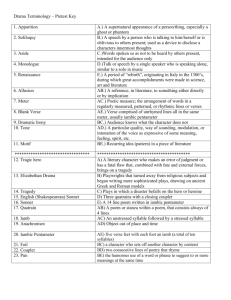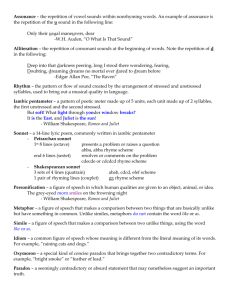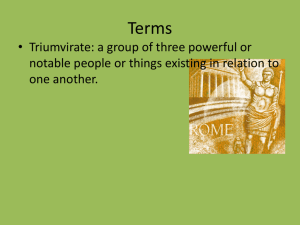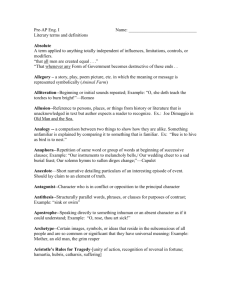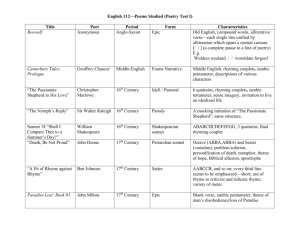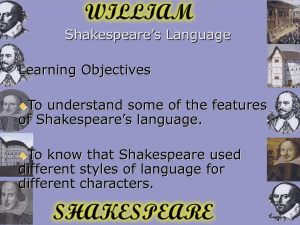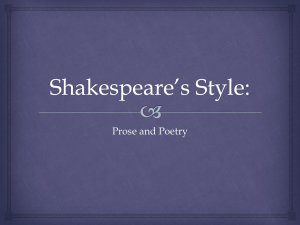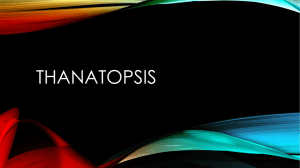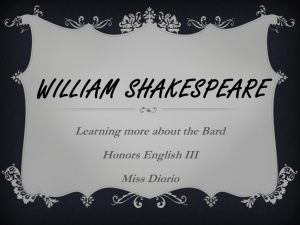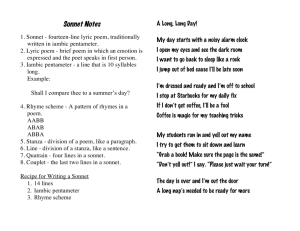Drama Vocabulary
advertisement
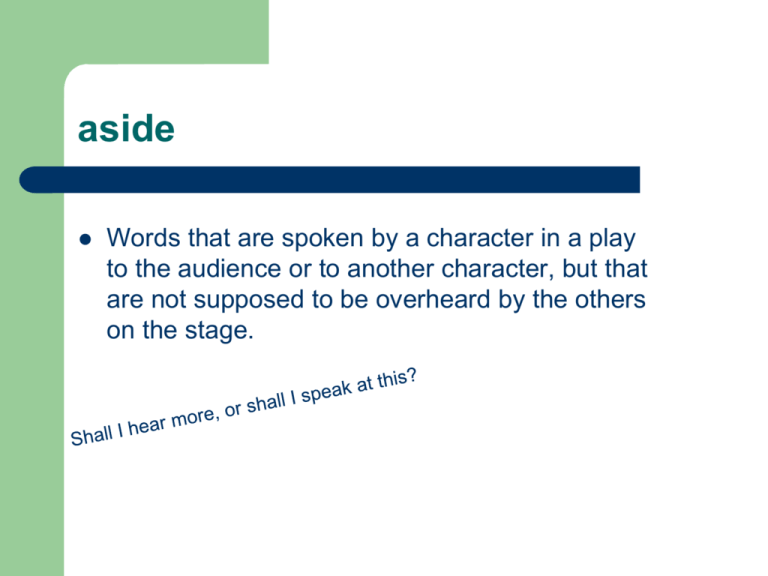
aside Words that are spoken by a character in a play to the audience or to another character, but that are not supposed to be overheard by the others on the stage. dramatic irony When the readers or audience know something that a character does NOT know which makes that character’s words or actions funny in a twisted sort of way. When Capulet tells Paris that Capulet is sure Juliet will be happy to marry Paris, his comments are funny to the audience because we know Juliet has already married Romeo, so she will NOT be happy to marry Paris. foil •Character who is used as a contrast to another character. apostrophe Words that are spoken to a person who is absent or imaginary, or to an object or abstract idea. Death, lie thou there. oxymoron A figure of speech in which two words with opposing meanings are used together intentionally for effect. pun • a joke which comes from a play on words Imagery • language that appeals to the senses that create vivid images monologue a speech by one character that is spoken to another character or characters soliloquy a speech in which a sole (single) character says his or her thoughts aloud, usually while he or she is alone on stage. paradox a statement that seems to contradict itself, but is true. personification figure of speech which gives human qualities to an object, an animal, or an idea tragedy a dramatic work which presents the downfall of a good character brought about by himself. tragic flaw •a trait (usually beyond the character's ability to control) that causes a character's downfall that may result in death dramatic conventions certain practices or methods that are accepted by a reader or an audience even though they are not realistic. allusion an indirect reference to another literary work or to a famous person, place or event. couplet a pair of rhyming lines usually the same length and meter. alliteration The repetition of an initial consonant sound. Peter Piper picked a peck of pickled peppers. iambic pentameter A line of poetry that has 10 syllables. Each lightly-stressed syllable is followed by a heavily-stressed syllable I hope that I can go to school today. blank verse Poetry that does not rhyme, but uses iambic pentameter as its meter. I wish I were a frog on lily pads. Then I could learn about the warming sun. And bask in golden sun on leaves all day. metaphor a comparison of two things without using the words “like” or “as.” When Romeo saw Juliet standing on her balcony he said, “Juliet is the sun.” simile a comparison of two things using “like” or “as.” She laughed like a hyena! foreshadowing When an author includes hints about what will happen later in the story. The prologue foreshadows the events of the play. comic relief a humorous scene, incident, or speech that is included in a serious play to break the tension hyperbole a figure of speech in which the truth is exaggerated. chorus in Greek tragedy, the chorus was a group of actors who commented on the actions of the characters Sonnet a fourteen-line lyric poem usually written in iambic pentameter. The English or Shakespearean sonnet consist of three quatrains (four-line stanzas) and a couplet (two lines), usually rhyming abab cdcd efef gg. Two households, both alike in dignity, In fair Verona, where we lay our scene, From ancient grudge break to new mutiny, Where civil blood makes civil hands unclean. From forth the fatal loins of these two foes A pair of star-cross'd lovers take their life; Whole misadventured piteous overthrows Do with their death bury their parents' strife. The fearful passage of their death-mark'd love, And the continuance of their parents' rage, Which, but their children's end, nought could remove, Is now the two hours' traffic of our stage; The which if you with patient ears attend, What here shall miss, our toil shall strive to mend.
